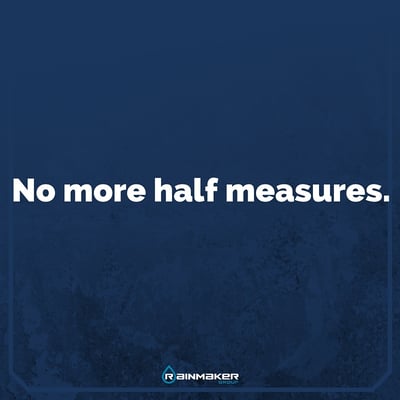I binge-watched the hell out of Breaking Bad.
I stayed up way too late when I shouldn't have.
Now I am sometimes find myself muttering, "Yo, yo, yo."
It's my colleague Joe's fault.
Like Joe, I dislike wasting time. I am "that guy" who powers up Ne tflix and watches one or two episodes of a series and then bails.
tflix and watches one or two episodes of a series and then bails.
Prior to experiencing Breaking Bad, I considered the program to be a knuckle-dragging series about someone selling Meth. I was wrong on so many levels.
Vince Gilligan is a story-telling genius. Every Breaking Bad character is carefully woven into the story for a purpose. Blink an eye and you will miss something essential. Despite the characters making a drug that destroys so many lives, I found myself rooting for Walt, his family, Jesse, and Mike.
The 32nd episode in particular, "Half Measures", struck a nerve with me.
"No more half measures, Walt."
The definition of "half measure" according to Mirriam Webster.
"a partial, halfhearted, or weak line of action."
Google defines half measure as:
"An action or policy that is not forceful or decisive enough."
Think about a decision you recently made that lead to a poor outcome. Chances are your decision was a half measure.
In the twelfth episode (22 min in) of the third season of Breaking Bad, Mike Ehrmantraut (played by Jonathan Banks) shared a powerful lesson of regret. He shared regret for a half measure that had horrible consequences.
Check out Mike's half measures speech here. His speech shares how as a cop he went on multiple repeat calls to a particular domestic dispute. He wanted to help the domestic abuse victim but his effort was a half measure. In the scene, he poignantly shared his regrets.
"I chose a half measure, when I should have gone all the way. I'll never make that mistake again. No more half measures, Walter."
Nine half measure decisions that have cost me dearly.
Here are just a few of my past half measures. I have:
- Rushed the sales hiring decision for a person with the experience but not the appropriate Behaviors, Motivators, Acumen, and Skills to do the job well.
- Delayed removing low-performing salespeople even when it was obvious they were never going to work out.
- Kept an experimental project alive longer than I should have.
- Maintained partnerships that were not mutually beneficial.
- Paid for good advice and then didn't follow it.
- Failed to seek the appropriate counsel prior to making a major decision.
- Tried to help non-believers believe who were never going to.
- Engaged "never-gonna-get-it" prospects who later became Customers I didn't really want.
- Half-heartedly executed a decision where from the very beginning I had misgivings.
How many of my past half measures look similar to yours? These decisions have cost me dearly.

How to reduce the potential for making half measures.
Following are seven ways to reduce the potential for making half measures.
Never hire salespeople based on gut instincts alone. Gut instincts are wonderful if you believe a burglar is in your home. Thanks to human bias, gut instincts are not particularly consistent in hiring the best salespeople. Use a job benchmark in combination with a multi-science sales personality test to ensure quality of sales hire.
Seek competent counsel. Good counsel can make and save you money. There is no need to get your own Phd from the "School of Hard Knocks" when it is almost always less expensive to bring in an expert.
Autopsy past projects and hiring decisions for evidence of half measures. Identify what went well and what went poorly. Look for early warning signs that can help you avoid making bad decisions.
Know when to cut your losses. If given the opportunity right now to reconsider every sales hiring or project decision and you find yourself reversing one or more, stop the bus and make a change.
Only make decisions that you can comfortably be "all in" emotionally. If the voice in your head says, "This is not going to work," as you make a decision that is a half measure.
Dollarize the scenarios of potential half measures. Review what should go well and what may not. Dollarize potential half measures. Scare the hell out of yourself. Compare successful and half measure decisions with actual data to double-check prior assumptions.
Determine who your ideal target persona is and stick to them. Only do business with those who have the capacity to get you and realize the full potential to benefit from your offerings. Avoid doing business with those who drain your energy and time with little return on investment.
No more half measures.




